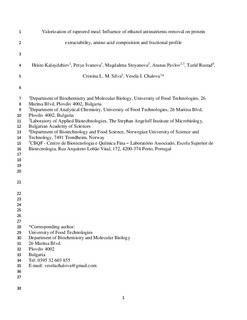Valorization of rapeseed meal: Influence of ethanol antinutrients removal on protein extractability, amino acid composition and fractional profile
Kalaydzhiev, Hristo; Ivanova, Petya; Stoyanova, Magdalena; Pavlov, Atanas; Rustad, Turid; Silva, Cristina L M; Chalova, Vesela I.
Journal article, Peer reviewed
Accepted version
Permanent lenke
http://hdl.handle.net/11250/2602577Utgivelsesdato
2019Metadata
Vis full innførselSamlinger
Originalversjon
https://doi.org/10.1007/s12649-018-00553-1Sammendrag
The production of rapeseed oil leads to generation of large quantities of rapeseed meal as a by-product. To increase the applicability of the rapeseed meal in feed and food industries, the content of antinutrient compounds is often reduced by treatment with ethanol. The aim of the study was to evaluate the influence of ethanol pre-treatment of the rapeseed meal on protein extractability, amino acid composition and fractional profile. The ethanol treatment of the rapeseed meal significantly increased the protein content from 37.4 to 42.3% and reduced the lipid concentration from 1.9 to 1.1%. Approximately 4- and 14-fold reductions of the phenols and glucosinolate contents were achieved respectively. Protein yield, however, was diminished from 26.4 to 23.6%. A stronger decrease of the protein yield, from 47.8 to 26.4%, was caused by processing of the rape seeds to rapeseed meal. The process resulted in the reduction of lysine content, while further ethanol treatment of the rapeseed meal affected more amino acids, both essential (threonine, phenylalanine) and non-essential (alanine, tyrosine, arginine, histidine). Comparative fractional protein profiles of rape seeds, rapeseed meal and ethanol treated rapeseed meal exhibited differences in both composition of the fractions and the relative quantity of the proteins. Data suggested that the treatment of the rapeseed meal with ethanol impacted protein solubility, amino acid composition and protein fractional profile. This knowledge is valuable when ethanol treated rapeseed meal is used either as a protein feed additive or as a source for generation of protein-rich ingredients with specific nutritive value and functionality.
